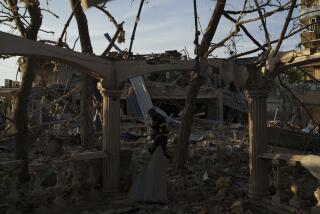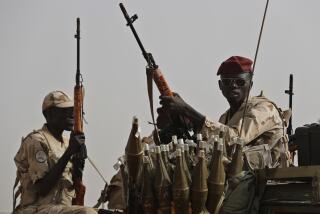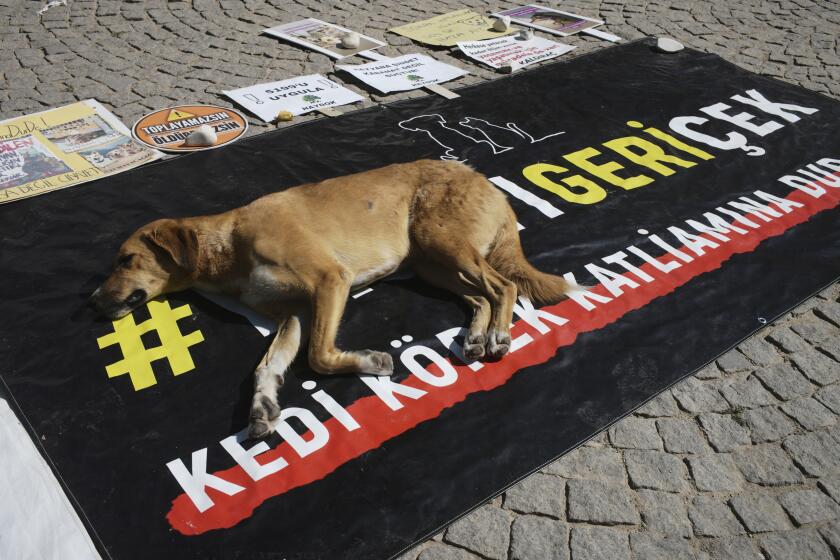Suicide bombing kills 20 in attack on Kurds of northern Iraq
In the latest apparent attempt by militants to exploit northern Iraq’s Arab-Kurdish frictions, a suicide truck bomber attacked a usually quiet Kurdish village Thursday, killing at least 20 people and wounding 43.
The truck detonated in Wardek, a poor farming community about 15 miles east of Mosul that is home to Shiite Kurds, police said.
The explosion knocked down many mud-brick homes and buried villagers, including women and children, in rubble, a police officer said. A second assailant was shot by Kurdish forces in the area before he could detonate another truck bomb, the officer added.
Although no group claimed responsibility, the attack was probably the work of Islamic extremists, who regularly carry out suicide bombings in Iraq.
Some districts in Nineveh province, of which Mosul is the capital, are controlled by the Iraqi army, and others, including Wardek, are policed by Kurdish forces from Iraqi Kurdistan. The Kurds wish to annex land to their semiautonomous region that they say was taken from them during Saddam Hussein’s rule, but local Arabs and the national government in Baghdad fiercely oppose such a move.
The U.S. military has offered to send troops to patrol alongside Kurdish fighters and Arab Iraqi soldiers to help cool tempers. So far, no decision has been reached, but some Arabs have started protesting an idea that they fear could formalize de facto boundaries.
Nineveh and the neighboring city of Kirkuk, considered the crown jewel of the north because of its vast oil reserves, have been hit by suicide attacks this summer.
Kurds were outraged over the bombing.
Villagers blamed the feud between the Arab-led provincial government and Kurdish political parties for the attack.
Hama Kakai, 45, a resident who was wounded in the blast, wondered why the village was targeted.
“This is the first time this has happened in our village, and we do not know why, because we are far from areas of violence,” Kakai said.
“I think that the political tensions in Mosul are the reason,” he added. “It is the settling of accounts among the political entities, but at our expense.”
Officials from Iraqi Kurdistan visited the blast site, where rescue workers were still digging for survivors. They faulted the local government in Mosul, with which they have been at loggerheads since an Arab coalition swept to power in January elections. When Nineveh’s Arab governor dispatched a representative, Kurdish troops barred him from entering.
“The peshmerga [Kurdish fighters] forbade me and a number of security forces officials from entering Wardek village,” said Ahmed Ubaid Issa, the mayor for Nimrud district. “We tried several times, yet all in vain.”
He was denied entry despite an effort by the Iraqi army to intervene, Issa added.
It was the second time since the spring that Kurdish peshmerga have blocked an Arab official from entering an area under their control. Last winter, U.S. troops had to defuse a confrontation between the Iraqi army and peshmerga over control of a checkpoint by the Mosul dam.
The bombing in Wardek came after a meeting this week held by U.S. diplomats in Mosul to mediate between the Arab-led Hadba party, which controls the provincial council, and the main Kurdish coalition. The Kurds, who have boycotted the provincial council since the spring after being snubbed for posts, have threatened to establish their own government to administer the sections of Nineveh under their control.
In Baghdad, Kurdish lawmakers also denounced the attack and demanded that the national government take action. They too blamed Nineveh’s Arab-led local government for promoting hostility against Kurds.
“The federal government should bear the responsibility for the people. The Kurds in Nineveh province are exposed to a genocide, from the forces of darkness and those who support them,” said lawmaker Mohsen Sadoun, reading a statement from the parliament’s Kurdish bloc.
--
Hayali is a special correspondent. Times staff writers Saif Hameed and Caesar Ahmed contributed to this report.
More to Read
Sign up for Essential California
The most important California stories and recommendations in your inbox every morning.
You may occasionally receive promotional content from the Los Angeles Times.








